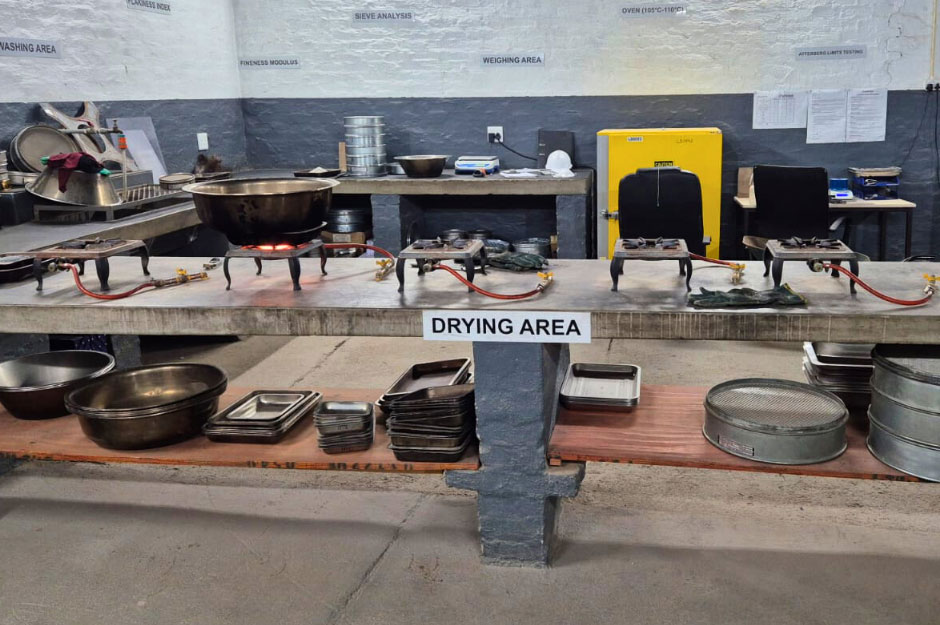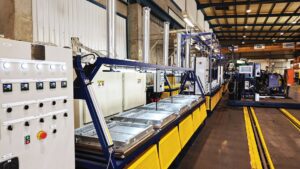At Afrimat, quality control plays a crucial role in aggregate production, helping identify potential defects, inconsistencies or impurities in construction materials.
According to Vermeulen, accurate testing and stringent quality control protocols guarantee that the company’s construction materials meet both industry standards and project specifications, contributing directly to the durability, integrity and safety of infrastructure projects.
Two tiers
The in-depth quality assurance regime at Afrimat entails two tiers – process control and quality control. Every quarry, says Vermeulen, has its own site laboratory, which tests material on a continuous basis, and that forms part of the process control regime. Afrimat also operates two Central Laboratories in two regions; one is situated in Gauteng at Lyttleton Dolomite Mine and the second in the Western Cape at Worcester, which oversees the quality control aspect of each quarry located in that cluster.
Following the recent successful acquisition of Lafarge, Afrimat has reconfigured its regional clusters into five, namely the South Cluster (Western Cape), South East Cluster (Eastern Cape), East Cluster (Coastal KwaZulu-Natal), Central Cluster (North of KwaZulu-Natal and Free State) and the North Cluster (Gauteng, Limpopo and Mpumalanga). Each of these clusters operates its own satellite laboratory, headed by the aggregate’s Product Technical team.
Quarrying Africa recently visited the North Cluster’s central lab, located at Afrimat’s Gauteng-based Lyttleton Dolomite Mine. The laboratory is responsible for overseeing quality control processes for the seven Afrimat quarries in the region, namely Lyttleton (Gauteng), Glen Douglas (Gauteng), Eckraal Quarry (Gauteng), Lephalale (Limpopo), Hartebeesfontein Quarry (Mpumalanga), Dingwell Quarry (Mpumalanga) and Karino (Mpumalanga).
As the aggregates quality manager for the North Cluster, Vermeulen is responsible not only for managing the central laboratory, but also for overseeing the satellite laboratories at each of the seven quarries, including training of personnel, ensuring adherence to testing standards and frequent auditing of these facilities.
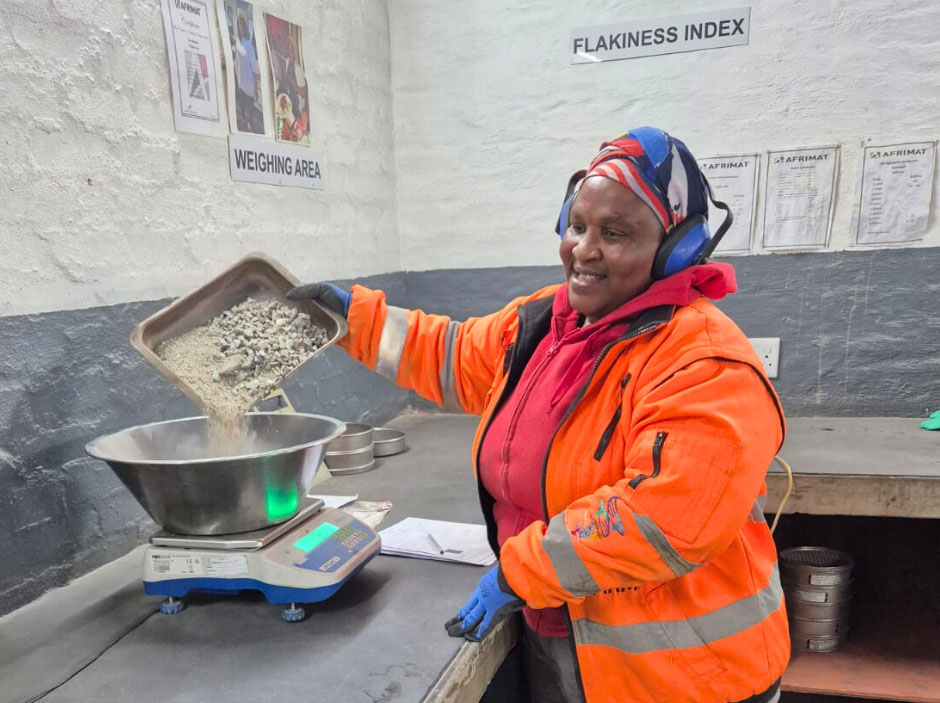
Relevant standards
The company’s meticulous approach to quality assurance involves rigorous testing procedures and adherence to stringent quality control protocols. Afrimat complies with a range of national standards across its laboratories.
At satellite level, laboratory personnel are trained to collect samples and run tests in accordance with standards such as TMH5, a set of methods for sampling road construction materials, detailed in the Technical Methods for Highways series. It provides guidance on how to collect samples from various sources such as natural rock masses, gravel pits, stockpiles and pavement layers for testing purposes.
The ultimate goal of TMH5 is to ensure that representative samples are collected for accurate testing, which is crucial for quality control in road construction. For example, for sampling of material such as G5 from a conveyor belt, explains Vermeulen, the minimum requirement under TMH5 is 120 kg of sample material, allowing site personnel to conduct parameters such as grading and flakiness index.
“Site laboratories are basically responsible for compliance. For example, for every certain number of tonnes produced, they need to take a test sample. For smaller quarries that produce, let us say, 30 000 t per month, they need to take a test sample for every 250 t produced. For larger quarries, site labs need to take a test sample for every 500 t produced. If for example, an operation produces 80 000 t per month, it means that they are supposed to take 160 test samples per month – that is how rigorous the process control regime is,” says Vermeulen.
In addition, Afrimat also complies with SANS (South African National Standards) 1083 for readymix concrete aggregates and SANS 1090 for plaster and mortar, as well as COLTO/COTO (Committee of Land Transport Officials) standards for road construction materials.
Increasing requirements for certified quality aggregates has also led surface mining industry association, ASPASA, to introduce its own guidelines and auditing systems to ensure testing of aggregates and crushed granular materials is carried out in accordance with the South African National Standards (SANS) 3001-AG and -GR series of test methods.
“AG methods are test procedures conducted on both coarse and fine aggregates. Coarse aggregates are those with a nominal size greater than 5 mm, and 85% of aggregate products falls in this category. Fine aggregates are those with a nominal size smaller than 5 mm. The test methods range from AG1 to AG23 and test various parameters such as flakiness index, grading and relative density, amongst others,” explains Vermeulen.
GR methods are testing procedures for gravels. These range from GR1 to GR57 and primarily focus on assessing the physical and mechanical properties of aggregates, ensuring they meet the necessary standards for construction and engineering applications. These tests include sieve analysis for gradation, specific gravity and absorption tests, soundness tests, abrasion resistance tests, aggregate crushing value tests and impact tests, amongst others.
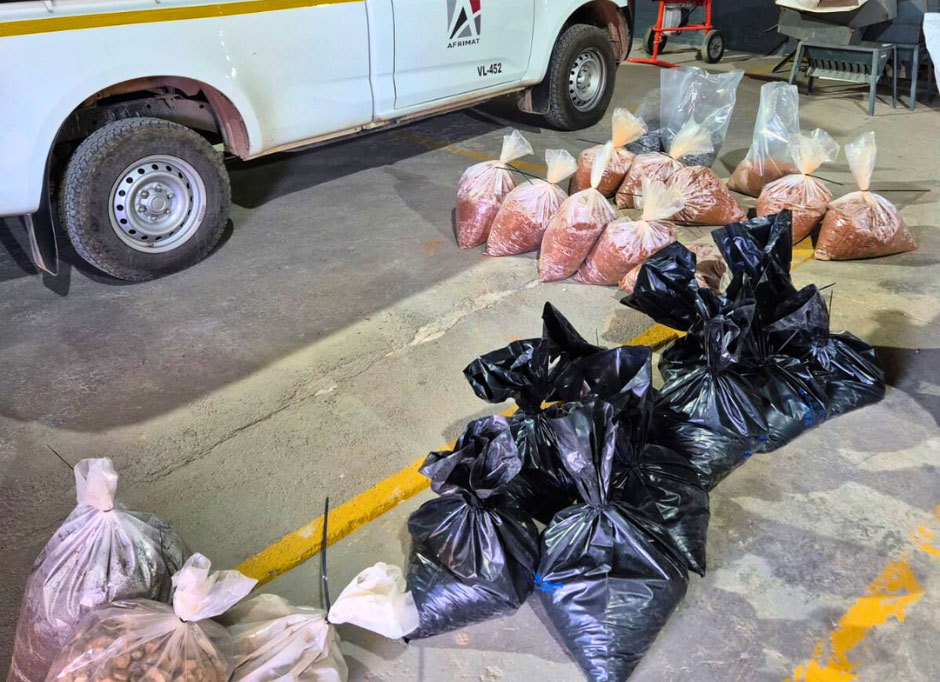
Compliance and continuous improvement
Compliance
Compliance to the relevant standards is achieved through sampling methods and frequency; strict adherence to testing protocols and calibration schedules; a trained and certified team conducting regular sampling and testing; internal audits and third-party verification (SANS-accredited labs); real-time tracking of test results to ensure immediate corrective action if deviations are identified; and ongoing training and awareness to keep staff updated on standards and best practices.
Corrective actions and preventive measures
All non-conforming materials are immediately quarantined and investigated through a root cause analysis. The process includes reviewing test data and production logs, as well as site inspections if required. Team debriefs to assess procedures or equipment faults may also be carried out. Corrective actions may involve adjusting processing configuration, retraining staff, or equipment servicing. Preventive measures are also put in place to avoid recurrence, and all actions are logged onto the company’s quality management system.
“All testing and production data is logged in a centralised Laboratory Information Management System (LIMS). Each batch is traceable through unique batch identifiers, linked test results and material specifications, and corrective actions. The system ensures secure archiving, easy retrieval and compliance with audit requirements. Access is role-based to maintain integrity and confidentiality,” explains Vermeulen.
Customer feedback
Customer feedback is also critical in improving the quality control regime. Feedback from customers is collected through client surveys and post-project reviews, as well as direct liaison with quality representatives on-site.
“Feedback is acquired through collaboration in technical meetings and audits. This feedback is analysed for improvement areas, and actions are prioritised based on impact. We then update test methods, provide targeted training, or adjust specifications accordingly based on industry changes,” explains Vermeulen.
Driving continuous improvement
At Afrimat, quality control teams drive continuous improvement efforts to enhance quality control processes. These include Tabular Report principles to identify and reduce variation, as well as regular training programmes and certification refreshers.
“In addition, we do cross checks with SANS-accredited external labs. Effectiveness is measured through reductions in non-conformance rates, improved turnaround times for test results and positive client feedback. Data-driven reviews are conducted through weekly Business Performance Reviews (BPR) to evaluate these key performance indicators (KPIs),” explains Vermeulen.
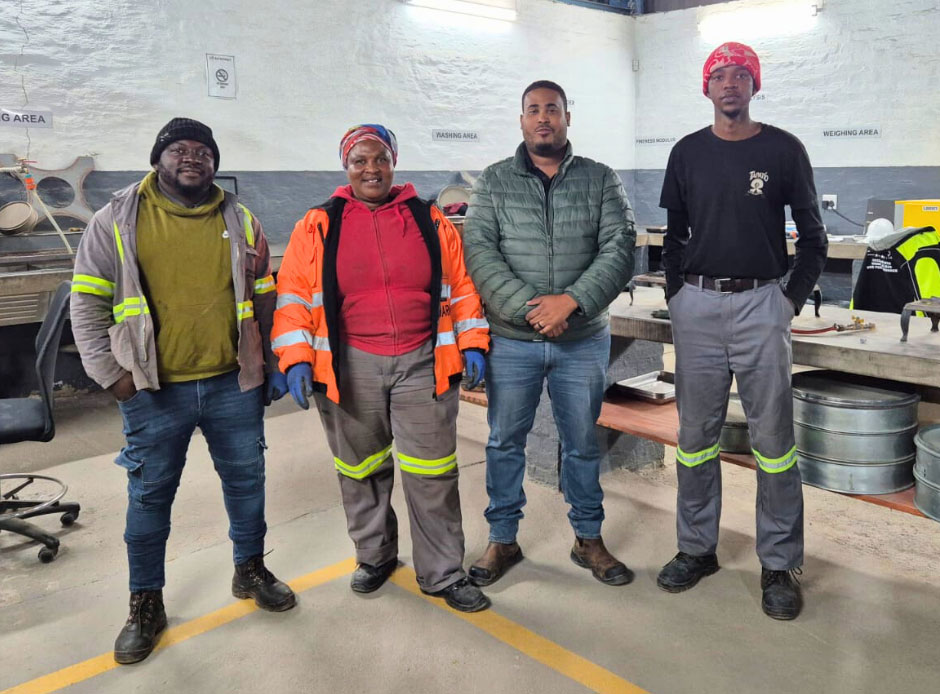
Types of tests
Afrimat performs a comprehensive range of tests. These start from source material evaluation to final product testing. “We start with the XRD (X-ray Diffraction) test, which gives us the geological composition of the parent rock. From those results we can determine what we can produce with the available rock, for example, base materials or concrete stone, depending on material properties,” says Vermeulen.
- Particle Size Distribution (sieve analysis) ensures the grading of aggregates meets required specifications for concrete, asphalt and base products.
- Apparent Relative Density and Water Absorption test determines the density and porosity of aggregates, which affect strength and durability.
- Flakiness Index, one of the common tests in aggregate production, measures the shape of particles, impacting compaction and workability.
- Atterberg Limits are carried out to determine the moisture contents at which fine-grained cohesive soils transition between solid, semi-solid, plastic and liquid states.
- Compaction (Modified AASHTO / Proctor) test evaluates the optimal moisture content and density for layers under roads and structures. Moisture Content test is critical for controlling mix designs in concrete production. Each test provides key insights into aggregate suitability and supports compliance with client and statutory standards.
- In addition, Ultra Fine Content and Clay Content & Methylene Blue tests are important for readymix concrete. This determines the proportion of very fine particles (such as silt and clay) within a sample of fine aggregate. High levels of fines can negatively impact concrete strength and workability, making this test crucial for quality control in construction.
“At Afrimat, quality control is not just a checkpoint – it is a mindset worked into our operations. Our laboratory’s role is both technical and strategic, ensuring that the materials we produce contribute to the success and longevity of infrastructure across South Africa. We are proud of the standards we uphold and the team that drives them forward,” concludes Vermeulen.
